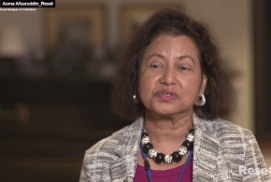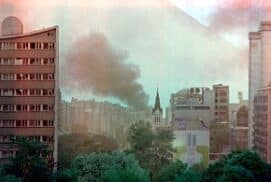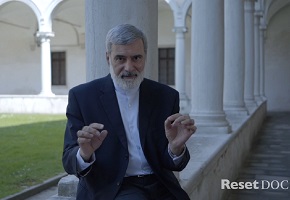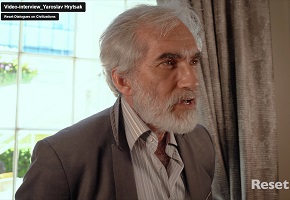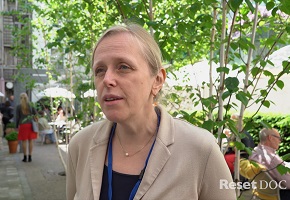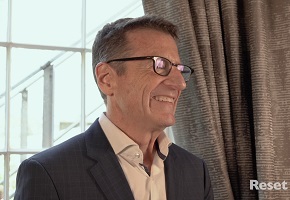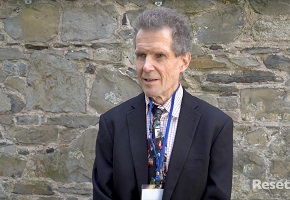
Videos

- Asma Afsaruddin 17 January 2025Asma Afsaruddin, professor of Islamic studies at Indiana University, talks about the challenges of achieving peaceful coexistence in the Israeli-Palestinian conflict. She highlights the need for equal rights and justice for all, pointing to the absence of a Palestinian state as a major obstacle.
- Ruth Hanau Santini 28 October 2024Ruth Hanau Santini, associate professor of Politics and International relations at the University of Naples L’Orientale, discusses how Tunisia’s democratic backslide stemmed from unimplemented reforms and an elite-driven process that sidelined public trust. These issues ultimately paved the way for populist influence, culminating in Tunisia’s current political crisis.
- Editorial Board 21 October 2024How did religion shift from fueling division to fostering dialogue in post-war Bosnia-Herzegovina? Reset DOC’s upcoming documentary explores the pivotal role of faith in reconciliation and peacebuilding. Catch the trailer now and stay tuned for the full release!
- Sharan Grewal 5 September 2024Sharan Grewal, Assistant Professor of Government at William & Mary, discusses Tunisia’s democratic collapse, attributing it to excessive consensus between political factions, which led to public disillusionment and the rise of populist leader Kais Saied. While a short-term return to democracy is unlikely due to Saied’s popularity, there may be a chance in the future.
- Radwan Masmoudi 27 August 2024For years, Tunisia was viewed as a democratic success in the Arab world. However, according to Radwan Masmoudi, President of the Center for the Study of Islam and Democracy (CSID), it ultimately failed because it was still in the process of developing into a full democracy, with weak political parties, unaddressed economic issues, and declining international support undermining its progress.
- Mohsen Kadivar 5 April 2024“Major elements of Islamic Shari’a are human dignity, justice, fairness and freedom: there is no force, no compulsion in the case of faith and religion.” An excerpt from the first part of ResetDOC’s latest video-interview with Mohsen Kadivar, Professor of Islamic Studies at Duke University, on pluralism in Islam.
- Yaroslav Hrytsak 11 March 2024Post-Soviet Ukraine has been considered a classic case of a “cleft country” torn between the agrarian Ukrainian-speaking West and the industrial Russian-speaking East. The Russian-Ukrainian war has revealed that despite strong regional divisions, Ukraine proved to be a very resilient political community, which led to the emergence of “the third Ukraine.” It is a Ukraine of neither the West nor the East, but of the Center, meant both in regional and political terms, as highlighted by Professor Yaroslav Hrytsak (Ukrainian Catholic University, Lviv).
- Anna Colin Lebedev 23 February 2024How can a war between two communities start without those two communities being involved in a conflict that preexists the war? And how is it that these communities eventually make sense of the conflict as something that is deeply socially rooted? Anna Colin Lebedev, Professor of Sociology at the Université Paris Nanterre, gives her assessment of the social roots of the war between Russia and Ukraine.
- Pieter Judson 23 January 2024“Most empires, but also most nation states are multicultural. The problem with the nation state is that it claims to be the state of one group. But all nation states include many groups. So we must ask the question, how are the minority groups treated? Do they have full citizenship? Often they do not.” From ResetDOC’s latest video-interview to Pieter Judson, Professor of 19th and 20th century history at the European University Institute. It was shot on the margins of Reset DOC’s Dublin Conference 2023, “Nationalism, Nation-Building, and the Decline of Empires.”
- Mark Kramer 5 January 2024What was the parable that led Soviet internationalism to Putin’s personalist nationalism? How can we imagine a post-Putin Russia? Mark Kramer (Davis Center, Harvard University) answers to these questions in this video-interview shot on the margins of Reset DOC’s Dublin Conference 2023, “Nationalism, Nation-Building, and the Decline of Empires.”


